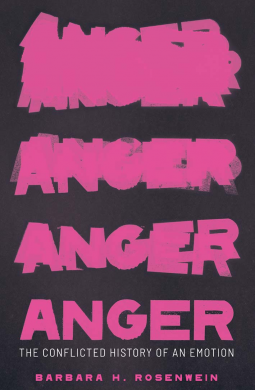Friday Friyay: 'Anger' by Barbara H. Rosenwein
Tracing the story of anger from the Buddha to Twitter, Rosenwein provides a much-needed account of our changing and contradictory understandings of this emotion
All of us think we know when we are angry, and we are sure we can recognize anger in others as well. But this is only superficially true. We see anger through lenses colored by what we know, experience, and learn.
Barbara H. Rosenwein traces our many conflicting ideas about and expressions of anger, taking the story from the Buddha to our own time, from anger’s complete rejection to its warm reception. Rosenwein explores how anger has been characterized by gender and race, why it has been tied to violence and how that is often a false connection, how it has figured among the seven deadly sins and yet is considered a virtue, and how its interpretation, once largely the preserve of philosophers and theologians, has been gradually handed over to scientists—with very mixed results. Rosenwein shows that the history of anger can help us grapple with it today.
Book Beginnings is at home on Rose City Reader, hosted by Gilion Dumas, and Friday 56 at Freda's Voice, hosted by Freda. I'll also be joining the Book Blogger Hop, hosted by Billy over at Ramblings of a Coffee Addicted Writer.
BB:
'Anger Rejected (Almost Absolutely)
I knew I was doing something wrong behind the couch; the tone of my mother's voice told me so. Some 2,500 years ago, the Buddha would have agreed that my anger was wrong - indeed, wrong-headed and selfdestructive.' 4%
Anger is such a fascinating emotion, which is why I wanted to write about it. In this book, Rosenwein tracks the whole history of anger, from Buddhism to Descartes to the present. I'm very intrigued to see how the perception of anger has changed, or even if it has at all.
F56:
'When the heart was seen as the center of emotions, when it was the cauldron where the blood was heated in anger or cooled in fear, there was no separation of body and emotion because the brain/mind/soul were part of bodily processes.' 56%
I am fascinated by all the different theories on emotions from the past. Whether it is the humours from the Greeks or what is called the hydraulic model, it is all interesting and it all makes a certain kind of sense. What I do like about some of these models is what Rosenwein points out here as well, which is the lack of separation between the emotions and the body. I have really noticed with my own anxiety how much of it is related to how I physically feel and how focusing on steady breathing, stretching etc. can also calm my emotions down.
BBH:
This week's question was suggested by Elizabeth from Silver's Reviews:
Do you use the Kindle app on your phone or iPad for reading e-books?
I only really read e-books on my Kindle itself, which I prefer. I have no issue reading longform articles etc. on my phone, but quite often, when it's a book, the screen feels too small for me on my phone, as if I'm not getting enough book. I know that doesn't really make any sense! I do use the NetGalley app, but I actually also don't like it when books are only available there. For things like cookbooks or comic books it makes complete sense, but I again miss the bigger screen when it's "normal" books. If I had an iPad or tablet then I would probably be happy to read on it as well, as the size is a bit better.
So that's it for me? What's your take on anger? And where do you read your e-books?







Great excerpts! Congratulations on your progress toward your thesis!
ReplyDeleteSounds like a really interesting book.
ReplyDeleteSounds like a fascinating book! Good luck in the home stretch!
ReplyDeleteFascinating, indeed!! Happy weekend!
ReplyDeleteI think I'm going to have to try this one. Thanks for sharing!
ReplyDeleteGood luck on your thesis! I feel the exact same way about reading books on my phone, so I read pretty much exclusively on my Kindle. Hope you have a great weekend! :)
ReplyDelete